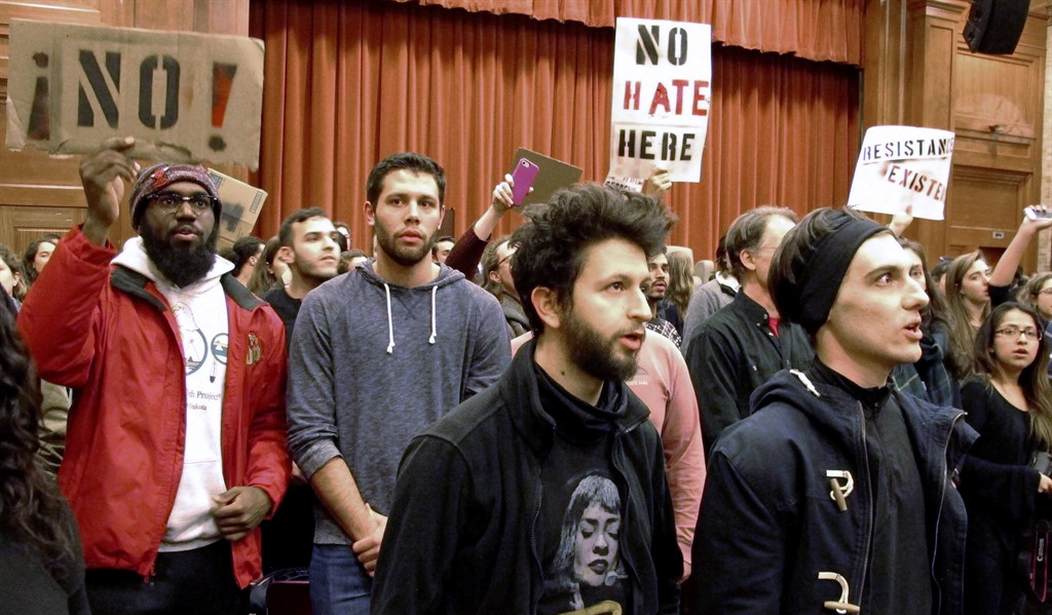Last week the NY Times published a piece titled “When is Speech Violence?” which purported to show that speech can have real world health consequences.
If words can cause stress, and if prolonged stress can cause physical harm, then it seems that speech — at least certain types of speech — can be a form of violence. But which types?
This question has taken on some urgency in the past few years, as professed defenders of social justice have clashed with professed defenders of free speech on college campuses. Student advocates have protested vigorously, even violently, against invited speakers whose views they consider not just offensive but harmful — hence the desire to silence, not debate, the speaker. “Trigger warnings” are based on a similar principle: that discussions of certain topics will trigger, or reproduce, past trauma — as opposed to merely challenging or discomfiting the student. The same goes for “microaggressions.”
The author’s project is to suggest that maybe there is something to this idea that speech is violence, scientifically speaking. Today, the Atlantic has a response from Jonathan Haidt and Greg Lukianoff, the authors of a 2015 piece on the topic titled “The Coddling of the American Mind.” Haidt and Lukianoff point out that the author of the NY Times piece has made some leaps of logic, i.e. failing to show how a short-term stressor like a campus speaker could be responsible for the kind of prolonged stress that is harmful to the body:
What would have happened had Yiannopoulos been allowed to speak at Berkeley? He would have faced a gigantic crowd of peaceful protesters, inside and outside the venue. The event would have been over in two hours. Any students who thought his words would cause them trauma could have avoided the talk and left the protesting to others. Anyone who joined the protests would have left with a strong sense of campus solidarity. And most importantly, all Berkeley students would have learned an essential lesson for life in 2017: How to encounter a troll without losing one’s cool…
Feldman Barrett’s argument only makes sense if Yiannopoulos’s speech is interpreted as one brief episode in a long stretch of “simmering stress” on campus. The argument works only if Berkeley students experience their school as a “harsh environment,” a “culture of constant, casual brutality” in which they are chronically “worrying about [their] safety.” Maybe that is the perception of some students. But if so, is the solution to change the school or to change the perception?
The authors go on to argue that the culture of the campus social justice warrior, intersectionality, is built around seeing patterns of oppression everywhere. It’s an outlook which tells students that there are no temporary stressors (discomfort, awkward remarks, etc.) because they are all really part of a system intended to do them harm (the patriarchy, white supremacy, etc.).
And here I’ll add my own point to this discussion, one which is not part of the Atlantic piece. Some researchers have found that pain is experienced more acutely if we think the person who hurt us intended to do so. From Science Daily:
Researchers at Harvard University have discovered that our experience of pain depends on whether we think someone caused the pain intentionally. In their study, participants who believed they were getting an electrical shock from another person on purpose, rather than accidentally, rated the very same shock as more painful. Participants seemed to get used to shocks that were delivered unintentionally, but those given on purpose had a fresh sting every time.
This would explain why when you accidentally bump heads with someone in your family the first thing you say is, “Sorry, it was an accident.” In other words, I didn’t mean to hurt you. That lack of intent may actually reduce the pain the other person experiences.
I don’t know if the same can be said of psychic pain but assuming for the moment it can, you can see why viewing something like microaggressions as unintentional, possibly ignorant comments could feel different than viewing the same comments as part of a broader effort to diminish people. Intersectionality seems designed to make people hurt more acutely, possibly without good reason in many cases. From Haidt and Lukianoff:
If students are repeatedly told that numerical disparities are proof of systemic discrimination, and a clumsy or insensitive question is an act of aggression (a “microaggression”), and words are sometimes acts of violence that will shorten your life, then it begins to make sense that they would worry about their safety, chronically, even within some of America’s most welcoming and protective institutions.
The authors don’t say this but their description fits with the idea of the campus snowflake, i.e. the person who has become so sensitive that they seem fragile and in need of a safe space at all times. Maybe the problem here isn’t that speech is violence but that the view of social justice being taught on many campuses encourages students to view every perceived slight as an intentional attack on their identity. Students would rather shout down the offenders than let another potentially wounding word pass their lips.








Join the conversation as a VIP Member